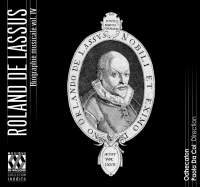Texte paru dans: / Appeared in:
Musique en Wallonie |
|
|
Outil de traduction (Très approximatif) |
|
|
|
|
|
Reviewer: J.
F. Weber The latest entry in this well conceived biography of Orlandus Lassus (Fanfare 35:6; 38:2) is called “old age” (la vieillesse), bringing us to his death even though a final disc will be issued later this year. Another ensemble is employed again, and another unfamiliar Mass is featured, Missa super Dixit Joseph (based on the composer’s motet, which follows it on the disc). The Mass is included to represent the significant amount of liturgical music that Duke William V ordered, even though it was written sometime earlier. It had been recorded about 1971 by Miroslav Venhoda in a series of discs that he made for a French label, but I never found a copy. Since Venhoda undoubtedly accompanied with a heavy hand, as was his wont, it would be a poor alternative to the 14 unaccompanied voices of this vocal ensemble. The Mass and motet are for six voices, and the text of the motet takes the passage from Genesis when Joseph reveals himself to his 11 brothers.
This account of the composer’s
life here begins in 1579 with the accession of William V, marked in the
first track by a madrigal written for the occasion. The notes, again by
Annie Coeurdevey, suggest that the composer was “stifled” by the duke’s call
for quantities of Counter-Reformation liturgical music, exemplified here by
one motet, Vidimus stellam, so he gave himself a breather by publishing
songs such as his Paris publisher brought out in 1581. One of the motets
from his Munich publisher’s 1582 book is heard next, a setting of First
Corinthians (ending “the greatest of these is love”). More madrigals follow
in 1587, dedicated to the young doctor who would treat Lassus in the illness
that befell him about 1590. In 1588 the German Psalms composed jointly by
Lassus and his son Rudolf were published, and the last book of motets
appeared in 1594, the Cantiones Sacrae. Philippe Herreweghe recently
recorded about half the book (32:3). The final motet in the book, Musica Dei
donum, heard here at the conclusion of the program, seems to be the only
familiar piece in the collection. These are only some of the pieces that
mark the last period in the composer’s life, a total of 23 tracks
illustrating the biographical course of the notes. The disc is elegantly
packaged in a bound book of the usual CD size. Altogether, this series is
fulfilling the promise first noted at the beginning. It is highly
recommended as an overview of the composer. | |
|
|
|
|
Cliquez l'un ou l'autre
bouton pour découvrir bien d'autres critiques de CD |
|




